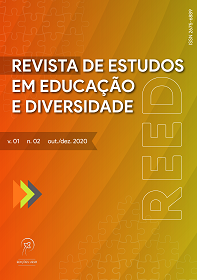A ESCOLA FRENTE AS DIFICULDADES EDUCACIONAIS DE ESTUDANTES EM SITUAÇÃO DE POBREZA E DESIGUALDADE SOCIAL
DOI:
https://doi.org/10.22481/reed.v1i2.7622Palavras-chave:
Escola Pública, Pobreza, Desigualdade Social, Dificuldades Educacionais., CurrículoResumo
O estudo tem como objetivo tecer uma análise crítica reflexiva acerca do que a equipe gestora e os professores de uma escola municipal da cidade de Camaçari na Bahia têm feito de concreto para ajudar os estudantes a superar dificuldades educacionais provenientes da situação de pobreza e desigualdade social em que se encontram. Metodologicamente ancorado na pesquisa de campo de abordagem qualitativa, o estudo revelou nuances antes não percebidas pelos profissionais da escola pesquisada, até então consideradas como algo natural no cotidiano escolar. Revelou ainda que os principais obstáculos que dificultam a aprendizagem e rendimento escolar são de diversas origens, desde a falta de alimentação adequada em casa e na escola até problemas de saúde.
Downloads
Referências
ABRAMOVAY, Miriam et al. Juventude, violência e vulnerabilidade social na América Latina: desafios para políticas públicas. Brasília: UNESCO/ BID, 2002.
ARAÚJO, Jurandir de Almeida. Educação, desigualdade e diversidade: grupos menos favorecidos frente ao sistema escolar brasileiro. Revista da ABPN, v. 4, n. 8, p. 114-125, jul./out. 2012.
ARAÚJO, Jurandir de Almeida. A Conjuntura Atual do Ensino Público no Brasil. Revista Direitos Humanos e Democracia, ano 2, n. 3, p. 125-157, jan./jun. 2014.
ARROYO, Miguel Gonzales. O direito à educação ameaçado: segregação e resistência. In: ARROYO, Miguel Gonzales; ABRAMOVICZ, Anete. (Orgs.). A reconfiguração da escola: entre a negação e a afirmação de direitos. Campinas, SP: Papirus, 2009. p. 129-159.
ARROYO, Miguel Gonzales. Módulo Introdutório: Pobreza, Desigualdades e Educação. Brasília: SECADI/MEC, 2014.
BRITO, Maria Helena de Paula; ARRUDA, Neivaely Aparecida de Oliveira de; CONTRERAS, Humberto Silvano Herrera. Escola, pobreza e aprendizagem: reflexões sobre a educabilidade. Educere - XII Congresso Nacional de Educação. Anais... PUCPR, 2015.
BRASIL, Ministério da Educação. Lei de Diretrizes e Bases da Educação Nacional, LDB de 9.394, de 20 de dezembro de 1996.
GAMA, Carolina Nozella; DUARTE, Newton. Concepção de currículo em Demerval Saviani e suas relações com a categoria marxista de liberdade. Interface - Comunicação, Saúde, Educação, v. 21, n. 62, p. 521-30, 2017.
GARCIA, Adir Valdemar; YANNOULAS, Silvia Cristina. Educação, pobreza e desigualdade social. Em Aberto, Brasília, v. 30, n. 99, p. 21-41, maio/ago. 2017.
GENTILI, Pablo. Pedagogia da Exclusão: crítica ao neoliberalismo em educação. São Paulo: Vozes, 1997.
LIBÂNEO, José Carlos. O dualismo perverso da escola pública brasileira: escola do conhecimento para os ricos, escola do acolhimento social para os pobres. Educação e Pesquisa, São Paulo, v. 38, n. 1, p. 13-28, 2012.
MINAYO, Maria Cecilia de Souza. Pesquisa Social: teoria, método e criatividade. 34 ed. Petrópolis: Vozes, 2015.
OLIVEIRA, Dalila Andrade; SARAIVA, Ana Maria Alves. A relação entre educação e pobreza: a ascensão dos territórios educativos vulneráveis. ETD – Educ. Temat. Digit. Campinas, SP. v. 17, n. 3, p. 614-632, set./dez. 2015.
SANTOS, Zélia Maria Melo de Lima. Escola como espaço de transformação: a articulação da educação, pobreza e desigualdade social no currículo escolar. Rev. Int. Investig. Cienc. Soc. v. 13, n. 2, p. 239-252, dez. 2017.
SILVA, Tomaz Tadeu. Documentos de Identidade: uma introdução às teorias do currículo. 2.ed. Belo Horizonte: Autêntica, 2003.
Downloads
Publicado
Como Citar
Edição
Seção
Licença
Você é livre para:
Compartilhar - copia e redistribui o material em qualquer meio ou formato; Adapte - remixe, transforme e construa a partir do material para qualquer propósito, mesmo comercialmente. Esta licença é aceitável para Obras Culturais Livres. O licenciante não pode revogar essas liberdades, desde que você siga os termos da licença.
Sob os seguintes termos:
Atribuição - você deve dar o crédito apropriado, fornecer um link para a licença e indicar se alguma alteração foi feita. Você pode fazer isso de qualquer maneira razoável, mas não de uma forma que sugira que você ou seu uso seja aprovado pelo licenciante.
Não há restrições adicionais - Você não pode aplicar termos legais ou medidas tecnológicas que restrinjam legalmente outros para fazer qualquer uso permitido pela licença.






